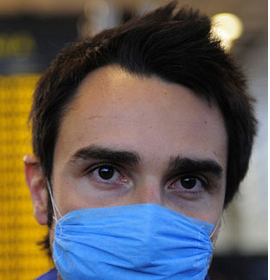As swine flu claimed its first U.S. victim and a total of six Bay Area cases were confirmed, a San Francisco public health official told reporters during a press conference this week that people should not be overly alarmed about the disease.
“The disease is very similar to seasonal influenza,” said Director of Communicable Disease Control and Prevention Dr. Susan Fernyak to the San Francisco Board of Supervisors Tuesday at a hearing on the role supervisors would play during a city emergency.
While there are still no confirmed cases of swine flu in San Francisco, there is indication that the public is very aware about the outbreak.
“All of the Kaiser Permanente facilities have noticed more phone calls and people coming in, but it’s not a huge increase,” said Kaiser spokesman Joe Fragola, when asked whether the number of patients visiting the San Francisco medical center had increased.
 |
| Photo by be_khe |
In a media statement, Dr. Stephen M. Parodi, chief of infectious disease for Kaiser Permanente Northern California, said the majority of those calling “have mild influenza like symptoms.”
“Following protocols, we are encouraging those who have mild symptoms to remain at home and limit contact with others to prevent the spread of influenza in the community, and we are scheduling appointments for patients who have significant symptoms,” Parodi said.
Fernyak said the health department is trying to communicate to the public that swine flu seen in the United States at this time is mild. She said a major problem is people with “flu-like symptoms” are going to clinics and emergency rooms, clogging the system and potentially spreading germs.
Fernyak said public health officials are “all watching the situation very carefully” adding that they “expect to have a case in San Francisco in the next few days.” She said currently the San Francisco public health community is not doing anything differently. If the situation worsens, she said the city is “in a position to move quickly” and implement “social distancing and school closings.”
Like the common flu, the Centers for Disease Control and Prevention said swine flu symptoms include fever, cough, sore throat, body aches, headache, chills, fatigue and in some instances, vomiting and diarrhea. The swine flu could cause a worsening of existing chronic illnesses in some people, CDC officials said.
The World Health Organization said there are about 148 swine flu cases, and of those, there have been seven deaths in Mexico — a relatively small number compared to deaths from the more common flu last year.
The exact number of deaths from the regular flu virus is difficult to determine, according to the CDC’s online flu report. Because of this, the CDC said, “flu-associated deaths are only a nationally notifiable condition among children.” During the 2007-2008 season, the CDC reported 83 deaths in children from the regular flu.
The same report said among the 225,329 specimens gathered from human patients and examined by the WHO and collaborating U.S. laboratories, 39,827 tested positive for some strain of the influenza virus.
As of Wednesday afternoon, there were 91 swine flu cases confirmed in the United States with 14 in California, according to the CDC.
Health officials confirmed that there are six Bay Area swine flu cases spread across three counties. The most recent cases include three Pittsburg elementary students and a 16-year-old girl from Santa Clara County.
On Monday, Marin County’s Department of Health and Human Services confirmed two swine flu cases in the area — a 60 year-old woman and her 20-month old granddaughter who both recently traveled to Mexico. Since then, Marin health officials said the child has recovered and that the woman now has only mild symptoms.
 |
| Photo by Isnt Gunna … |
At the state level, Governor Arnold Schwarzenegger proclaimed a State of Emergency Tuesday, eliminating any bureaucratic red tape in order for health departments to get the resources needed to respond to the outbreak.
The governor called on Californians to be extra cautious and to use common sense measures to help prevent the further spread of swine flu. Things like covering one’s nose and mouth when coughing or sneezing, washing hands thoroughly and avoiding contact with others if people feel sick.
Rachel Kagan, the spokeswoman for San Francisco General Hospital, said she hasn’t seen a significant increase in the number of patients due to news about the swine flu. She did say there were some concerned parents who took their kids to the pediatric unit for testing.
“The hospital has conducted 30 flu tests. However, we don’t have any admissions or confirmed cases,” Kagan said. “We hope to keep it that way.”
Kagan added that since this is a virus, it can spread fast and that local cases could very well occur. She said the hospital is trying to educate people to seek testing only if they are seriously ill or have flu-like symptoms.
“We’re trying to discourage people from seeking tests simply because they are curious,” Kagan said.”










